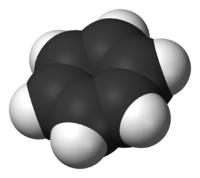
Photo from wikipedia
ABSTRACT Previous studies have demonstrated that oxidative stress is implicated in benzene‐induced hematotoxicity. However, the low dose‐response effects and the mechanism underlying perturbation of hematopoiesis remain to be defined. This… Click to show full abstract
ABSTRACT Previous studies have demonstrated that oxidative stress is implicated in benzene‐induced hematotoxicity. However, the low dose‐response effects and the mechanism underlying perturbation of hematopoiesis remain to be defined. This study aims to address the role of Nrf2 pathway in mediating benzene‐induced hematotoxicity. Nrf2+/+ (wildtype, Nrf2‐WT) and Nrf2−/− (knockout, Nrf2‐KO) mice were administrated with benzene at doses of 0.1, 1.0, 10.0, 100.0 mg/kg by oral gavage for a consecutive 4 weeks (6 times/week). As a result, benzene exposure caused a decline of WBC and lymphocyte counts in a dose‐dependent manner at a dose range from 1.0 to 100.0 mg/kg, while low dose benzene induced hormesis effects. Interestingly, Nrf2 deficiency seemed to relieve the decline of peripheral blood cell counts upon benzene exposure, indicating the involvement of Nrf2 in regulation of benzene‐induced hematotoxicity. The suppression of phase II enzyme expression in Nrf2‐KO mice resulted in considerable reduction in detoxification indicated by the decrease of urinary S‐phenylmercapturic acid (SPMA), a metabolite of benzene. Ex vivo assay revealed enhanced cytotoxicity and oxidative stress were induced by benzene in Nrf2‐KO mice. Notably, the depletion of Nrf2 triggered the proliferation and differentiation of hematopoietic cells, but induced aberrant morphological changes in periphery erythrocytes and bone marrow cells, implicating the compensatory effects carried on at the expense of induction of dysfunctional blood cells. Our findings provide a new insight into a low dose–response towards benzene‐induced hematotoxicity and uncover the critical role of Nrf2 pathway in mediating abnormal hematopoiesis in response to oxidative stress. HighlightsLow‐dose benzene exposure induces hormesis effects on mouse hematotoxicity.Nrf2 knockout results in the enhanced cytotoxicity and oxidative damage.Nrf2 depletion triggers abnormal hematopoiesis upon benzene treatment.
Journal Title: Toxicology and Applied Pharmacology
Year Published: 2018
Link to full text (if available)
Share on Social Media: Sign Up to like & get
recommendations!